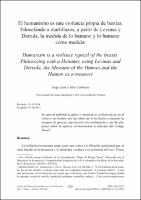Por favor, use este identificador para citar o enlazar este ítem:
https://repositorio.usj.es/handle/123456789/553
| Título : | El humanismo es una violencia propia de bestias. Filosofando a martillazos, a partir de Levinas y Derrida, la medida de lo humano y lo humano como medida |
| Otros títulos : | Humanism is a violence typical of the beasts. Philosozing with a Hammer, using Levinas and Derrida, the Measure of the Human and the Human as a measure |
| Autor: | León Casero, Jorge



Urabayen, Julia 

|
| Palabras clave : | Levinas; Derrida; Alteridad; Heteronomía; Otredad; Bestialidad; Alterity; Heteronomy; Otherness; Bestiality |
| Fecha de publicación: | 2016 |
| Editorial : | UNIV COMPLUTENSE MADRID, SERVICIO PUBLICACIONES |
| Citación : | Urabayen J, León J. El humanismo es una violencia propia de bestias. Filosofando a martillazos, a partir de Levinas y Derrida, la medida de lo humano y lo humano como medida. ASHF [Internet]. 8 de abril de 2016 [citado 8 de abril de 2021];33(1):253-84. Disponible en: https://revistas.ucm.es/index.php/ASHF/article/view/52297 |
| Resumen : | La reflexión levinasiana surge como una crítica a la filosofía tradicional que, al estar basada en la presencia y la identidad, conduce a la exclusión del otro. Frente a un pensar onto-lógico, el lituano propone que la ipseidad del ser humano sea constituida por la alteridad, y lo sea éticamente, porque el sujeto es sujeto-a, es decir, responsabilidad. En un intento por llevar aún más allá la obligada atención a la otredad del otro, Derrida desarrollará una crítica radical a la postura levinasiana. Deconstrucción de todo rastro de ipseidad y soberanía en la relación con el otro, la lectura de la obra de Derrida aquí realizada apuesta por una concepción no definible de lo humano. De ahí que toda de-limitación de un ámbito ético como propiamente humano conlleve una violencia bestial que el levinasiano humanismo del otro pretendía superar. |
| Descripción : | Levinas’s reflections arose as a critique of traditional philosophy which, since it was based on presence and identity, leads to the exclusion of the other. Instead of an onto-logical thought the Lithuanian proposes that the ipseity of the human being be constituted by alterity, and that it be so ethically, because the subject is sub-ject, that is, that which upholds, responsibility. In an attempt to take the obligatory attention to the otherness of the other even further, Derrida would develop a radical critique of the Levinasian posture. Deconstruction of every trace of ipseity and sovereignty in the relationship with the other, the reading that we have done of the work of Derrida opts for a no definable understanding of the human. That is why every de-limitation of an ethical field as a properly human implies a brutal violence that the levinasian humanism of the other tried to exceed. |
| URI : | https://repositorio.usj.es/handle/123456789/553 |
| ISSN : | 0211-2337 |
| Aparece en las colecciones: | Artículos de revistas |
Ficheros en este ítem:
| Fichero | Descripción | Tamaño | Formato | |
|---|---|---|---|---|
| El humanismo es una violencia propia de bestias.pdf | 161,23 kB | Adobe PDF |  Visualizar/Abrir |
Este ítem está sujeto a una licencia Creative Commons Licencia Creative Commons

